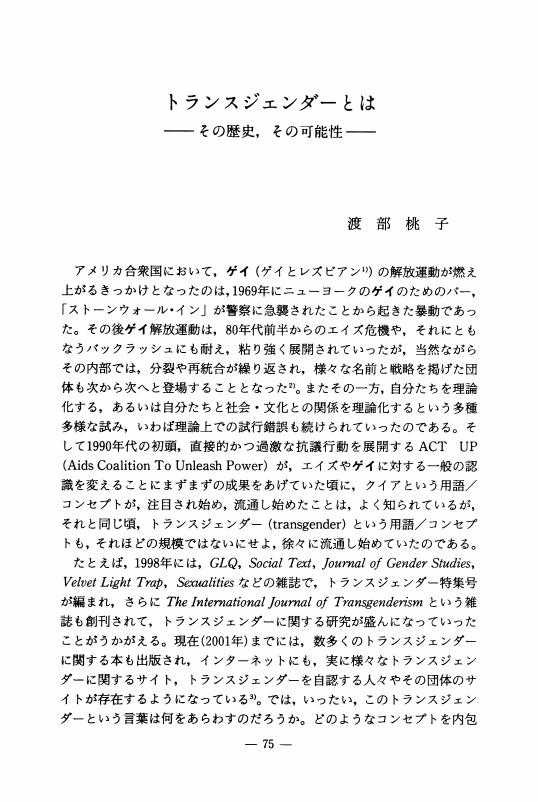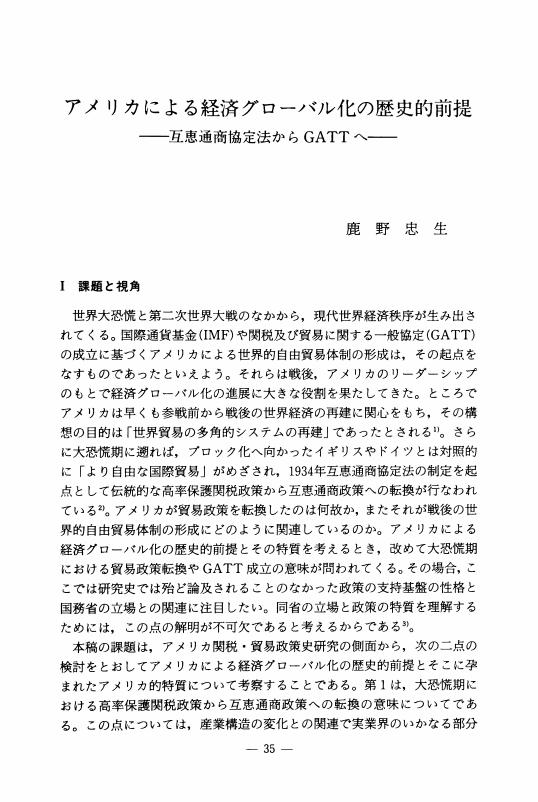129 0 0 0 OA ロックフェラー財団と太平洋問題調査会 冷戦初期の巨大財団と民間研究団体の協力/緊張関係
- 著者
- 佐々木 豊
- 出版者
- アメリカ学会
- 雑誌
- アメリカ研究 (ISSN:03872815)
- 巻号頁・発行日
- vol.2003, no.37, pp.157-175, 2003-03-25 (Released:2010-11-26)
- 参考文献数
- 70
82 0 0 0 OA トランスジェンダーとは その歴史, その可能性
- 著者
- 渡部 桃子
- 出版者
- アメリカ学会
- 雑誌
- アメリカ研究 (ISSN:03872815)
- 巻号頁・発行日
- vol.2002, no.36, pp.75-89, 2002-03-25 (Released:2010-11-26)
- 参考文献数
- 58
18 0 0 0 OA 工場制度成立期におけるローウェルの女工たち その生活と労働
- 著者
- 久田 由佳子
- 出版者
- アメリカ学会
- 雑誌
- アメリカ研究 (ISSN:03872815)
- 巻号頁・発行日
- vol.1995, no.29, pp.229-239, 1995-03-25 (Released:2010-10-28)
- 参考文献数
- 62
12 0 0 0 OA 「客間」と「書斎」――空間表象に見るエマソンの家政学
- 著者
- 冨塚 亮平
- 出版者
- アメリカ学会
- 雑誌
- アメリカ研究 (ISSN:03872815)
- 巻号頁・発行日
- vol.54, pp.187-207, 2020-04-25 (Released:2021-09-11)
Almost all of the major works of Ralph Waldo Emerson (1803–1882), except his diaries, were written after his move to Concord in 1834. This paper examines the themes of intimacy and solitude in his essays and lectures, mainly focusing on representations of space. In “Love” and other essays included in Essays: First Series (1841), Emerson stresses the importance of home as the central site for developing intimate relationships with others. Based on the argument of Henri Lefebvre, this essay reconsiders experiences in space as being “lived,” mainly paying attention to the perspective of gender.In antebellum America, individualism expanded rapidly, along with “domestic ideology” with a particular emphasis on the aspect of ownership. Just as Alexis de Tocqueville emphasized the phases of isolation and withdrawal, so the ideas of American individualism and ownership were both generated retrospectively by the border line that divides the inner and the outer. According to Milette Shamir and Amy Kaplan, female writers of advice books in the mid-nineteenth century discussed issues of home economy based on the proposition that this division of the inner and the outer, or study and parlor, is stable.On one hand, Emerson similarly criticizes the elements of space, like “Egyptian wilderness” and “tents of a night,” which have no distinct borders with the outer. On the other hand, it is notable that he uses metaphors of doors that link “home” and “street,” and one of his servants likened his house to a hotel. These images of “door” and “hotel” deconstruct the boundary between two spaces—inner and outer.As Barbara Ryan and Christopher Newfield severely criticized, it is certain that Emerson’s relationships with servants and his own family members—his “domestic and social experiments”—were not necessarily successful. He held patriarchal authority in his home to a certain extent, although the relationships were partly reciprocal and equal. Nevertheless, in his family, only Emerson could freely choose to open and shut the door to his private room.For Emerson, however, an ambivalence between these binary oppositions of space and gender was at stake. Unlike the contemporary authors of advice books, his lecture “Home” (1838) grappled with issues of domestic economy and household as a practical experiment that fluidizes and renews every boundary related to the household. Furthermore, just as he stated that conversation is the “first office of friendship” in the lecture “The Heart” (1838), so he also compared the sense of friendship to a spacial rhetoric.Emerson could transcend the gender conflict—namely the binary of parlor and study—by conversation not with his own family members or servants, but with friends like Margaret Fuller, whom he repeatedly praised for her outstanding capacity for dialogue. As D.W. Winnicott insisted, Emerson could cultivate “the capacity to be alone” or find solitude, not in withdrawal to his study, but in the parlor with friends like Fuller or in the lecture hall with the audiences of “Home”.
12 0 0 0 大学における「結婚講座」の始まり:1920年代の結婚観
- 著者
- 緒方 房子
- 出版者
- JAPANESE ASSOCIATION FOR AMERICAN STUDIES
- 雑誌
- アメリカ研究 (ISSN:03872815)
- 巻号頁・発行日
- vol.1981, no.15, pp.35-51, 1981
10 0 0 0 OA ロシア革命とウィルソン主義
- 著者
- 草間 秀三郎
- 出版者
- アメリカ学会
- 雑誌
- アメリカ研究 (ISSN:03872815)
- 巻号頁・発行日
- vol.1993, no.27, pp.39-55, 1993-03-25 (Released:2010-10-28)
- 参考文献数
- 33
10 0 0 0 大学における「結婚講座」の始まり:1920年代の結婚観
- 著者
- 緒方 房子
- 出版者
- アメリカ学会
- 雑誌
- アメリカ研究 (ISSN:03872815)
- 巻号頁・発行日
- vol.1981, no.15, pp.35-51, 1981
- 著者
- 森本 あんり
- 出版者
- アメリカ学会
- 雑誌
- アメリカ研究 (ISSN:03872815)
- 巻号頁・発行日
- vol.2002, no.36, pp.91-109, 2002
9 0 0 0 OA ピンプ・カルチャー
- 著者
- 金澤 智
- 出版者
- アメリカ学会
- 雑誌
- アメリカ研究 (ISSN:03872815)
- 巻号頁・発行日
- vol.2006, no.40, pp.99-117, 2006-03-25 (Released:2010-11-26)
- 参考文献数
- 27
8 0 0 0 トランスジェンダーとは:その歴史, その可能性
- 著者
- 渡部 桃子
- 出版者
- JAPANESE ASSOCIATION FOR AMERICAN STUDIES
- 雑誌
- アメリカ研究 (ISSN:03872815)
- 巻号頁・発行日
- vol.2002, no.36, pp.75-89, 2002
- 著者
- 牧田 満知子
- 出版者
- アメリカ学会
- 雑誌
- アメリカ研究 (ISSN:03872815)
- 巻号頁・発行日
- vol.1997, no.31, pp.157-174, 1997-03-25 (Released:2010-10-28)
- 参考文献数
- 41
7 0 0 0 OA 第二次世界大戦期のハワイにおける軍隊と性 ホテル・ストリートの繁盛が意味するもの
- 著者
- 島田 法子
- 出版者
- アメリカ学会
- 雑誌
- アメリカ研究 (ISSN:03872815)
- 巻号頁・発行日
- vol.2000, no.34, pp.105-121, 2000-03-25 (Released:2010-11-26)
- 参考文献数
- 68
7 0 0 0 OA 第二次大戦期のアメリカ労働運動
- 著者
- 長沼 秀世
- 出版者
- アメリカ学会
- 雑誌
- アメリカ研究 (ISSN:03872815)
- 巻号頁・発行日
- vol.1967, no.1, pp.85-111, 1967-02-20 (Released:2010-06-11)
- 参考文献数
- 156
6 0 0 0 OA スコープス裁判と1920年代の不寛容
- 著者
- 常松 洋
- 出版者
- アメリカ学会
- 雑誌
- アメリカ研究 (ISSN:03872815)
- 巻号頁・発行日
- vol.1991, no.25, pp.21-38, 1991-03-25 (Released:2010-10-28)
- 参考文献数
- 118
6 0 0 0 OA アメリカによる経済グローバル化の歴史的前提 互恵通商協定法からGATTへ
- 著者
- 鹿野 忠生
- 出版者
- アメリカ学会
- 雑誌
- アメリカ研究 (ISSN:03872815)
- 巻号頁・発行日
- vol.2000, no.34, pp.35-52, 2000-03-25 (Released:2010-10-28)
- 参考文献数
- 59
6 0 0 0 OA 「偉大な社会」の夢
- 著者
- 大森 彌
- 出版者
- アメリカ学会
- 雑誌
- アメリカ研究 (ISSN:03872815)
- 巻号頁・発行日
- vol.1987, no.21, pp.54-73, 1987-03-25 (Released:2010-10-28)
- 参考文献数
- 31
5 0 0 0 OA 映画スター早川雪洲
- 著者
- 宮尾 大輔
- 出版者
- アメリカ学会
- 雑誌
- アメリカ研究 (ISSN:03872815)
- 巻号頁・発行日
- vol.1996, no.30, pp.227-246, 1996-03-25 (Released:2010-10-28)
- 参考文献数
- 105
- 著者
- 三牧 聖子
- 出版者
- アメリカ学会
- 雑誌
- アメリカ研究 (ISSN:03872815)
- 巻号頁・発行日
- vol.53, pp.99-118, 2019-04-25 (Released:2021-09-17)
This paper explores the experience of the two prominent émigré International Relations (IR) scholars, Hans J. Morgenthau (1904–1980) and Stanley Hoffmann (1928–2015), both of whom fled from war-torn Europe to the United States, especially focusing on their views on the roles and ethics of the intellectuals in the society. Being “outsiders” in American academia and society, they both critically analyzed the status of American IR scholarship in a detached way.Morgenthau criticized a “new scholasticism” widely found in American IR scholarship, which he defined as “an intellectual exercise executed with a high degree of acumen and sophistication, that tells us nothing we need to know about the real world.” Seeing scholars’ primary mission in “speaking truth to power,” even if power may try to discredit, silence, and corrupt them, Morgenthau insisted that a scholar should not be silent when great issues were before the public and the government. Though Morgenthau several times served the government as an adviser to the State Department and the Defense Department, he gradually became disillusioned with the government’s dogmatic cold war policy, and turned himself from a Washington Policy adviser into one of the harshest critics of American military involvement in Vietnam. During the 1960s, Morgenthau attended numerous anti-war teach-ins and protest events, where he severely criticized the so-called “best & brightest” who served the Kennedy and Johnson administration for spreading self-serving myths and deluding themselves and the nation.In his seminal article “An American Social Science: International Relations” published in 1977, Hoffmann bitterly criticized the proximity of IR scholarship to the corridors of power, arguing that intellectuals should be independent from political and any other undue external influence, and seek knowledge for their own sake. Unlike his colleagues at Harvard, such as Henry Kissinger and Zbigniew Brzezinski, Hoffmann never felt tempted to serve the government as a policy adviser or become involved in policy-making in Washington D.C. He continuously warned of a risk that scholars’ activities would be shaped not by pursuit of truth but by their desire to be “relevant” to policy concerns. Hoffmann also criticized American scholars’ preference for abstract theorizing and their indifference to concrete lives of the people in the other countries. Hoffmann always put his emphasis on history and human agency. Being a French intellectual in the United States, Hoffmann continuously criticized American exceptionalism and emphasized how this hubristic concept made American people blind to new realities in world politics. Hoffmann was one of the most vocal opponents of George W. Bush’s Iraq War, which cast a dark shadow on the transatlantic relations.Morgenthau and Hoffmann were never afraid of being an outsider in American society in their pursuit of fulfilling their duty as an intellectual. At the same time, from the experience that they could find a refuge in the United States after long suffering in Europe, they believed in America’s moral authority and its long tradition of democracy, which gave them courage to stand up for the truth. In their belief and behavior, they were more “American” than American intellectuals who yielded to power and betrayed American ideals.
5 0 0 0 OA 南部民主党の「保守革命」路線 DLCの前史としての「ロブ革命」
- 著者
- 松岡 泰
- 出版者
- アメリカ学会
- 雑誌
- アメリカ研究 (ISSN:03872815)
- 巻号頁・発行日
- vol.1994, no.28, pp.131-149, 1994-03-25 (Released:2010-10-28)
- 参考文献数
- 87
5 0 0 0 OA 誤作動する武器 クレメント・グリーンバーグ, 文化冷戦, グローバリゼーション
- 著者
- 加治屋 健司
- 出版者
- アメリカ学会
- 雑誌
- アメリカ研究 (ISSN:03872815)
- 巻号頁・発行日
- vol.2003, no.37, pp.83-105, 2003-03-25 (Released:2010-11-26)
- 参考文献数
- 167













